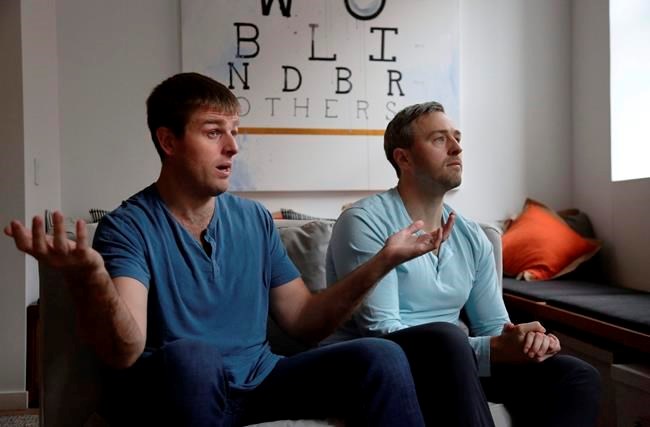NEW YORK — Would you buy something you can’t see?
That’s the question posed by two New York brothers who’ve lost much of their vision to a rare degenerative eye disorder and have dedicated their lives — and livelihoods — to raising money for a cure.
Bradford Manning, 35, and his 30-year-old brother, Bryan, are the founders of the clothing brand Two Blind Brothers. They’ve hit on a strategy that’s helped raise more than $700,000 for the cause: selling mystery boxes full of an assortment of their ultra-soft shirts, cozy socks, knit beanies and sunglasses.
The two turn over all profits from the boxes and their other sales to groups like the Foundation Fighting Blindness, funding research on retinal eye ailments like the one they’ve suffered from since they were 5, Stargardt disease. It’s an inherited form of macular degeneration that causes central vision loss over time.
“We just wanted to try and help and raise awareness, and just do something good,” said Bryan.
Since 2016, when they left their previous careers -- Brad worked for an investment firm and Bryan sold software -- they’ve picked up celebrity supporters like Ice-T and entrepreneur Richard Branson. Ellen DeGeneres helped with one of her famous Shutterfly checks for $30,000.
And the sale of their mystery boxes, costing from $30 to $200, is now a social media phenomenon.
Customers have included relatives of the blind, among them parents with vision impaired children; some have posted unboxing videos on TikTok, Facebook and Instagram, with a few opening boxes blindfolded.
The brothers hit on the idea in 2015, when a gene therapy discovered by an underfunded researcher for an unrelated juvenile eye disease was about to hit the market.
“It was mind boggling to us,” Bryan said. “Our whole lives they were like, `Oh, a cure is down the line, a cure is down the line.’ This one isn’t for us, but it is happening, and the Foundation Fighting Blindness kicked this off with just a tiny charitable gift to this brilliant researcher.”
Soon after, they were separated while shopping at Bloomingdale’s. When they reconnected, they found that they had purchased the same soft shirt.
“It was the feel of it. It felt so soft and comfortable that we both keyed upon it, and then we had this idea, well what if we could take this sense of touch to a different place, make super comfortable clothing” and turn over the profits to researchers at work on eye diseases, Bryan said.
With advice from friends in the fashion industry, two blind brothers became Two Blind Brothers.
The casual line of super soft Henleys, hoodies, polos and T-shirts for men and women, along with offerings for kids, are made of sustainable bamboo mixed with cotton and spandex. They’ve incorporated Braille indicating the
The goods were originally manufactured in Texas, mostly by visually impaired people. But as they’ve grown, most of the operation moved to Los Angeles.
Brad was diagnosed at 7 after their mother, a nurse, found a doctor who determined that Stargardt disease was the cause of his declining vision.
The doctor told her to “take him home, get him a magnifier and maybe teach him Braille, and good luck,” Bryan recalled. But they would not give up on their sons. Today, their condition has slowed, leaving both with peripheral vision.
The brothers include their story in every mystery box, with some special thanks.
“When someone shops blind, they prove something remarkable,” they write. “They prove that genuine trust is real.”
___
Associated Press writer Jessie Wardarski in New York contributed to this story.
___
“One Good Thing” is a series that highlights individuals whose actions provide glimmers of joy in hard times -- stories of people who find a way to make a difference, no matter how small. Read the collection of stories at https://apnews.com/hub/one-good-thing
___
Associated Press religion coverage receives support from the Lilly Endowment through the Religion News Foundation. The AP is solely responsible for this content.
Leanne Italie, The Associated Press



